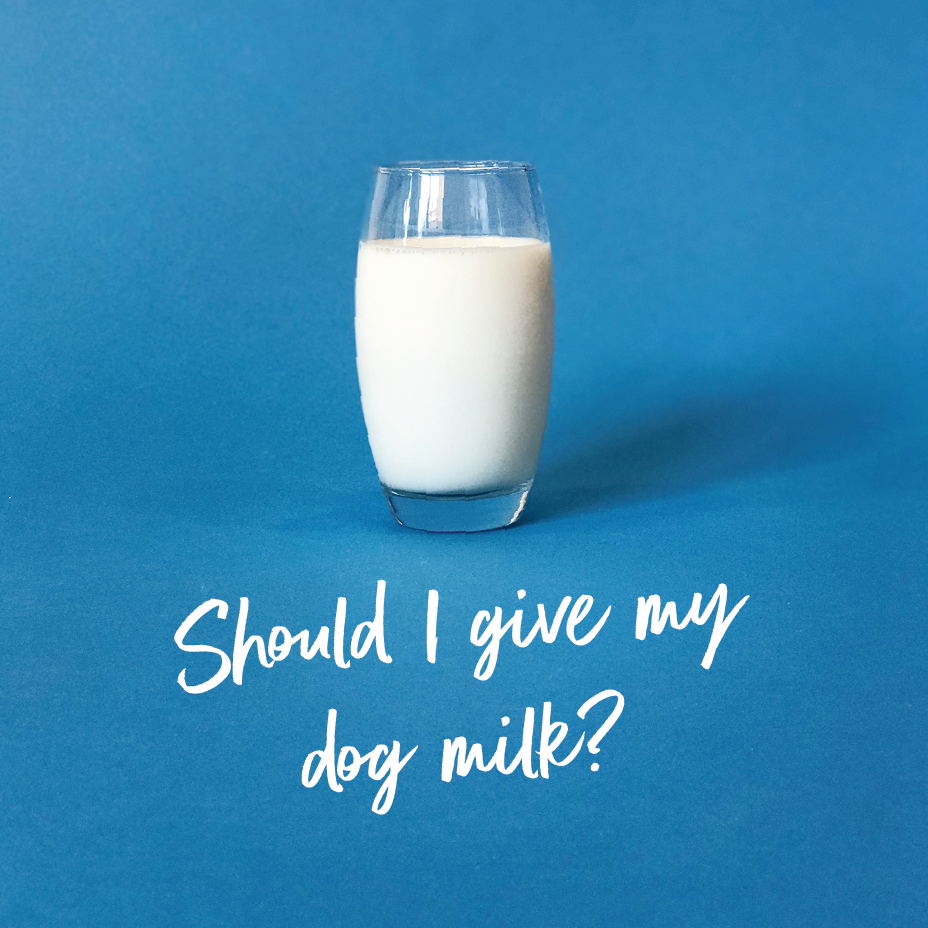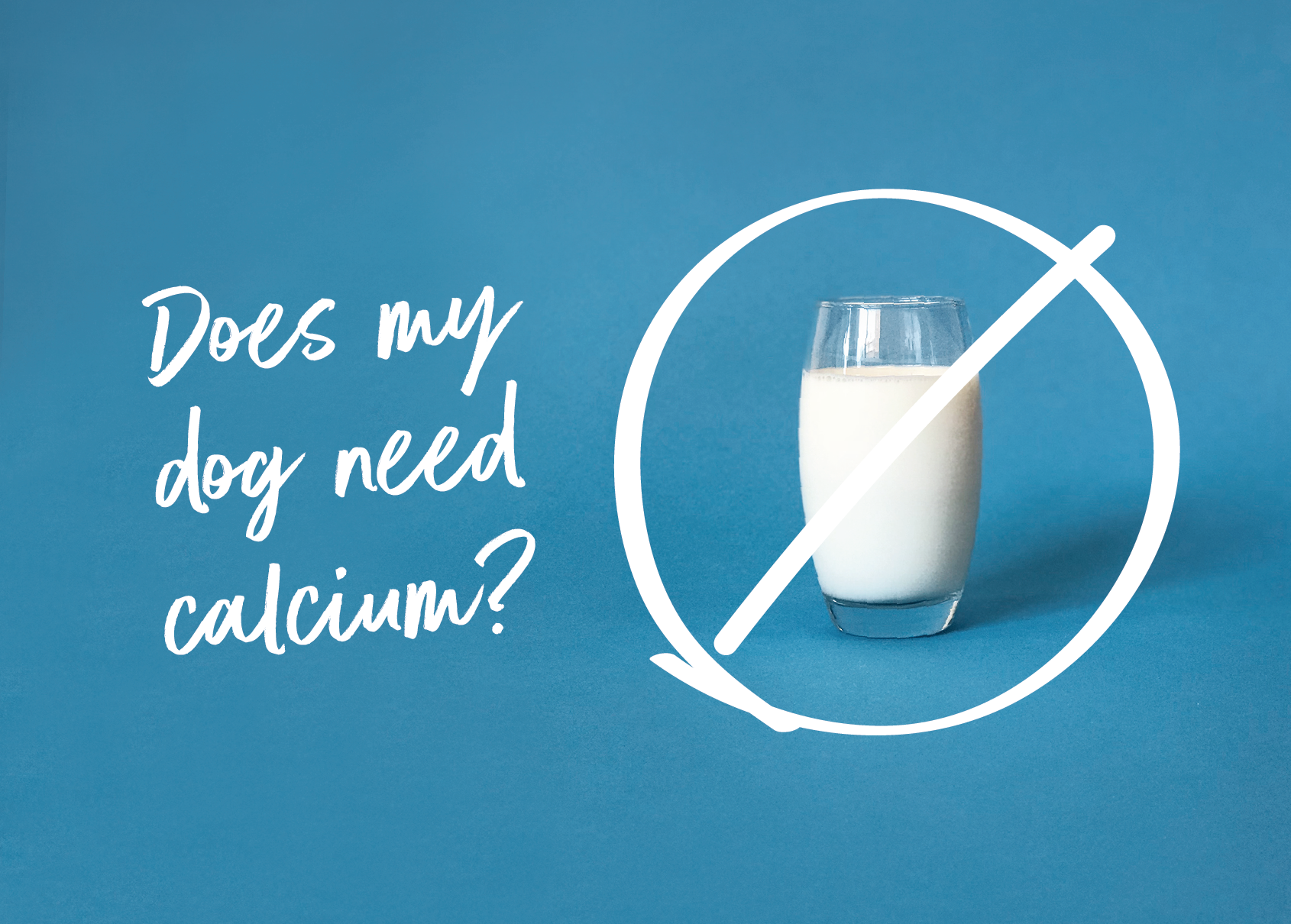Calcium. This super-boosting mineral does more than just give us strong and healthy bones, so should it go in our dog’s diets too? What part does calcium play in dog nutrition? Can dogs drink milk? We asked our Lead Nutritionist, Dr Samantha Ware.
What does calcium do for dogs?
As an essential mineral, it does a lot. As well as supporting teeth and bone health, did you know calcium helps your dog’s blood clot properly? What’s even more impressive, is that calcium helps your dog’s muscles lengthen and contract, and it even plays an important part in essential processes in your dog’s cells.
Which foods are good sources of calcium for dogs?
Foods that contain calcium include:
- Broccoli
- Kale
- Dark leafy greens
- Meat
- Ground bone
What’s ground bone?
If you haven’t heard of it before, it’s exactly what it says – tasty bone in a powdered form. Dogs love bones, and ground bone lets your dog get all the nutritional benefits from it, without any of the risks that can come from eating them (splinters, bone bits that get lodged where they shouldn’t).
Your dog can also get calcium from natural non-food sources like limestone. This is often where the calcium in calcium supplements comes from.
What happens when dogs don’t get enough calcium?
In extreme cases, calcium deficiency in dogs can cause:
- Poor growth
- Weakness or lethargy
- Muscle tremors or twitching
- Bone and joint problems
- Stress fractures
- Convulsions
Studies show that large and giant breeds need specific levels of calcium at certain life stages. Factors like breed and life stage also change your dog’s ideal balance of calcium in relation to other minerals, like phosphorus, for example.
Can I give my dog too much calcium?
Too much calcium can cause your dog to develop problems like kidney stones. It can also cause large breeds to grow too quickly for their bones and joints to develop properly. This can lead to problems like hip dysplasia, osteochondrosis and hypertrophic osteodystrophy in adulthood.
Can dogs drink milk?
Milk is a good source of calcium for us, but isn’t such a healthy choice for our dogs. That’s because many dogs are lactose intolerant – milk can upset their stomach, give them gas or cause them to bloat.

What about puppies and milk?
It used to be common for people to give milk to puppies, but not these day. Puppies have the enzymes they need to digest lactose when they’re young, but lose them once they’re older. So if you’re a puppy owner wondering whether or not to give your little one milk, we recommend you don’t. If they don’t get a taste for it now, you’ll never have to worry about excluding it later.
How much calcium do puppies need?
Calcium is an important nutrient for growth and development, so puppies often need more than adult dogs.
This doesn’t mean giving calcium supplements to a growing puppy though. Puppy foods already contain high levels of calcium, and too much calcium can be harmful to them. It will affect bone growth and development, and can leave your dog with bone density problems. It may also affect how your puppy absorbs other important minerals, like zinc.
Of course, with a tails.com blend, you can be sure your dog is getting the balance they need. That’s because we work out the right level of calcium for puppies, based on their age, weight, breed, and more. As they get older, grow bigger and move around more, we adjust the calcium level in their food to match. So their blend is suitable for every stage of their life.
I don’t have a puppy, should I give my adult dog calcium supplements?
If your adult dog eats a healthy, balanced diet, there’s probably no need to add a calcium supplement to their routine. However:
- Pregnancy – if your dog’s pregnant with a large litter, she may need more calcium to make sure there’s enough to go around
- Calcium deficiency – if your vet has diagnosed this, a supplement can redress the balance.
What else does my dog need for healthy bones?
Calcium works with phosphorus to support healthy teeth and bones. Levels of these minerals need to be carefully balanced in your dog’s food, because too much of one can stop your dog getting the benefits of the other.
Working out the right balance of the minerals is all part of your dog’s unique recipe, and for tails.com customers it’s sorted in just a few clicks. Once we know your dog’s age, breed and a few other details, you’ll have it in seconds – ready to eat when you get their kibble blend delivered.


Very interesting. …my dogs love about a Table Spoon of milk in the morning….but, on reading this, i may not do this anymore. ….is Hemp Milk any better?…as thats what i have….
thanks for all the great advice, and ideas on this Blog. …fab….
Hi Catherine,
The jury is out on whether hemp oil or other hemp products are safe for dogs, or whether the benefits for humans even apply to dogs. In any case, it’s extra calories, and not required as part of a balanced diet for your pup so we’d probably recommend steering clear
Hi – we have been told (by the breeder) that we should not give cow’s milk to dogs/pups but Goats milk is ok. Our two have thrived on it but only get a small amount daily.
Can I give my dog raw egg?
What dog food is best for a dog who has increased potassium levels
Hi Sharon,
Can you please send this question to hello@tails.com so that our team of experts can help you?
Kind regards,
Sophie
How much calcium should I be giving my 4 month old ShihTzu, who weighs 3.3 kg ?
My puppy eat my their mothers calcium. Is this harmful to her?
Hi Nics,
If your puppies are still weaning, it’s not harmful to the mother. You just need to make sure she’s on the right food – have a chat to your vet for some advice.
Millie